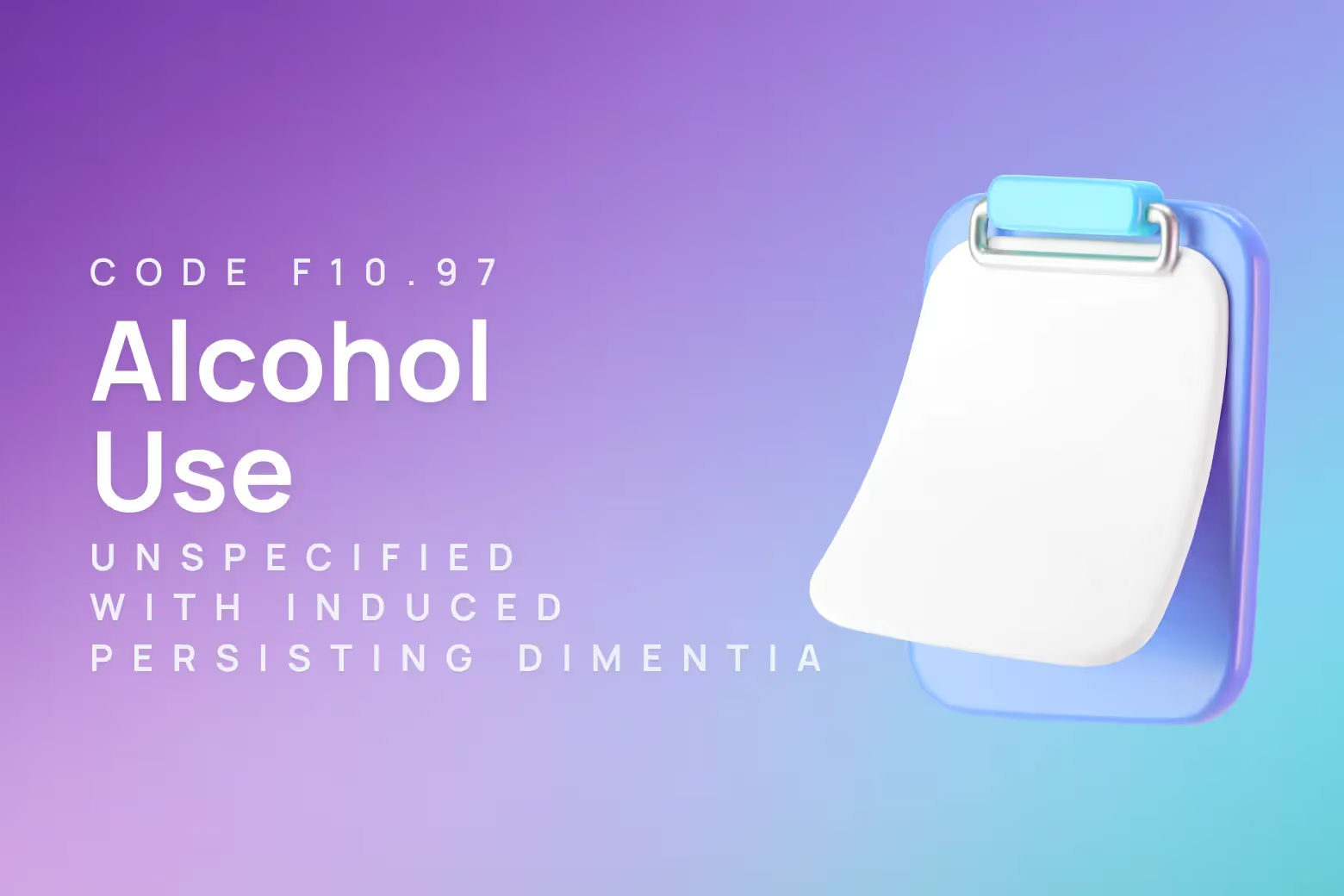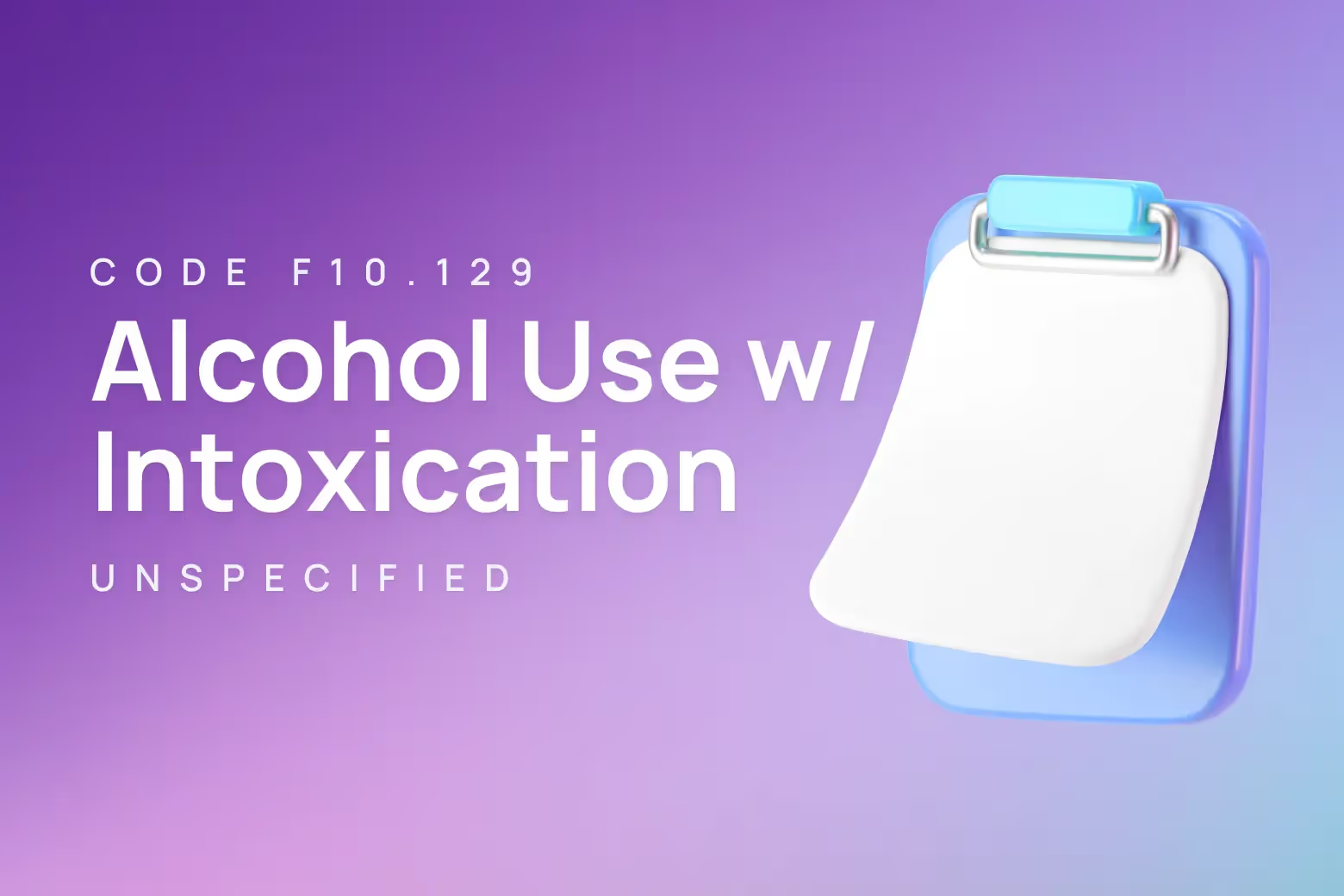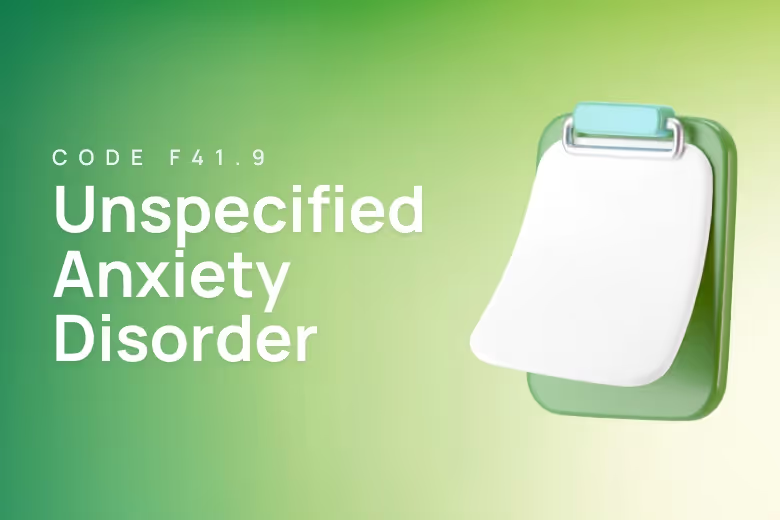ICD-10 code for alcohol use, unspecified, with alcohol-induced persisting dementia

F10.97 is the ICD-10 code for alcohol use, unspecified, with alcohol-induced persisting dementia.
This code captures cases where chronic alcohol use has resulted in significant and persistent cognitive impairment that resembles dementia.
Accurate diagnosis requires careful assessment to distinguish this condition from other forms of cognitive decline.
Key features:
- Represents persistent cognitive impairment directly caused by prolonged alcohol exposure
- Includes alcohol-related brain damage presenting as dementia-like symptoms
- Requires evidence of substantial cognitive decline affecting daily functioning
- Distinguished from acute confusional states and other alcohol-induced disorders

Diagnostic criteria for alcohol-induced persisting dementia (F10.97)
Alcohol-induced persisting dementia represents a severe form of alcohol-related brain injury that develops after years of excessive drinking.
This condition affects multiple cognitive domains including memory, executive function, and abstract thinking.
The diagnosis requires clear evidence that cognitive impairment developed in direct relationship to chronic alcohol use.
Clinicians must establish that the person had normal cognitive functioning before the onset of problematic drinking patterns.
Several key criteria must be met for this diagnosis:
- Evidence of multiple cognitive deficits including memory impairment and at least one additional cognitive disturbance
- Impairments severe enough to cause significant functional decline in occupational or social activities
- Clear relationship between cognitive decline and history of alcohol dependence or abuse
- Cognitive deficits persist beyond the period of acute intoxication or withdrawal
- Symptoms not better explained by another medical condition or different form of dementia
The cognitive changes typically develop gradually over months or years rather than appearing suddenly.
Memory problems usually affect both recent and remote recall, while executive dysfunction impairs planning and judgment abilities.
When to use F10.97 diagnosis code
Differential diagnosis remains critical when considering alcohol-induced persisting dementia.
Several conditions can present with similar cognitive impairment patterns, requiring careful clinical evaluation.
F10.97 vs F10.96 (Alcohol use, unspecified, with alcohol-induced persisting amnestic disorder)
The primary distinction lies in the scope of cognitive impairment. F10.96 involves isolated memory deficits, particularly affecting the ability to form new memories or recall recent events.
F10.97 encompasses broader cognitive decline affecting multiple domains beyond memory alone. This includes impaired judgment, abstract thinking, language difficulties, and personality changes that collectively resemble dementia.
F10.97 vs other dementia codes (F03.90, G30.9)
Primary dementias like Alzheimer's disease develop independently of substance use patterns. These conditions have distinct neuropathological features and progression patterns.
Alcohol-induced dementia shows direct temporal correlation with drinking history and may show partial improvement with sustained abstinence.
Brain imaging often reveals characteristic patterns of atrophy affecting frontal and cerebellar regions preferentially (Guidelines for the Treatment of Alcohol Problems).
Related ICD-10 codes
- F10.96 Alcohol use, unspecified, with alcohol-induced persisting amnestic disorder
- F10.99 Alcohol use, unspecified, with unspecified alcohol-induced disorder
- F10.20 Alcohol dependence, uncomplicated
- F10.10 Alcohol abuse, uncomplicated
- F10.921 Alcohol use, unspecified, with intoxication delirium
- F10.231 Alcohol dependence with withdrawal delirium
Interventions and CPT codes for alcohol-induced persisting dementia
Treatment approaches for alcohol-induced persisting dementia focus on preventing further deterioration while addressing cognitive rehabilitation and family support needs.
Comprehensive diagnostic evaluation
Initial assessment requires thorough medical and neuropsychological evaluation. Testing should be delayed until at least four weeks after achieving sobriety to allow for potential cognitive recovery.
Relevant CPT codes include 90791 for psychiatric diagnostic evaluation and 96116-96120 for neurocognitive assessment when conducted by qualified professionals.
Cognitive rehabilitation therapy
Structured cognitive training can help maximize remaining abilities and teach compensatory strategies. Family education about cognitive limitations helps establish realistic expectations and safety planning.
Individual therapy sessions addressing these needs would typically use CPT codes 90834 or 90837 depending on session duration.
Family therapy addressing caregiver education and support planning uses codes 90846 or 90847.
Medical management and monitoring
Ongoing medical supervision addresses nutritional deficiencies, particularly thiamine supplementation to prevent further brain injury.
Regular monitoring for depression and other psychiatric complications requires careful attention.
Follow-up evaluations and medication management typically involve CPT codes 99212-99215 for established patient visits, with complexity determined by the scope of medical decision-making required.
How Upheal improves F10.97 ICD-10 documentation
Suggesting appropriate ICD-10 codes based on session content
Upheal's documentation platform analyzes therapy session content to identify patterns consistent with alcohol-induced cognitive impairment.
The system recognizes key clinical indicators like memory complaints, executive dysfunction reports, and family concerns about cognitive decline.
The platform cross-references these observations with documented alcohol use history to suggest F10.97 when appropriate.
This helps clinicians avoid overlooking the connection between cognitive symptoms and substance use patterns.
Maintaining HIPAA-compliant records with proper diagnostic coding
Documentation for alcohol-induced persisting dementia requires careful attention to progression notes and cognitive status tracking.
Upheal enables clinicians to maintain secure records while ensuring diagnostic criteria are clearly documented.
The platform tracks cognitive assessment results over time, helping establish the persistent nature of impairments required for this diagnosis. Progress notes automatically capture relevant clinical observations supporting the diagnostic criteria.
Reducing administrative burden so you can focus on client care
Complex cases involving cognitive impairment generate substantial documentation requirements for insurance authorization and care coordination.
Upheal automates much of this paperwork while maintaining clinical accuracy.
The platform generates comprehensive treatment summaries highlighting cognitive functioning changes and intervention responses. This saves clinicians time while ensuring thorough documentation for case management needs.
Supporting clients with alcohol-induced persisting dementia
Treatment planning for alcohol-induced persisting dementia requires realistic goal-setting that acknowledges the typically irreversible nature of this condition.
Focus shifts from cognitive recovery to maximizing remaining abilities and ensuring safety.
Family involvement becomes essential for successful treatment outcomes.
Caregivers need education about cognitive limitations and strategies for supporting daily functioning while maintaining the person's dignity and autonomy.
Creating structured environments that minimize confusion while promoting engagement helps maintain quality of life.
This might include consistent routines, clear communication strategies, and activities matched to current cognitive abilities.
Upheal's clinical documentation platform can help track treatment progress and coordinate care team communications, allowing clinicians to focus on providing compassionate, evidence-based care for these complex cases. Learn more about how Upheal supports your clinical practice.













